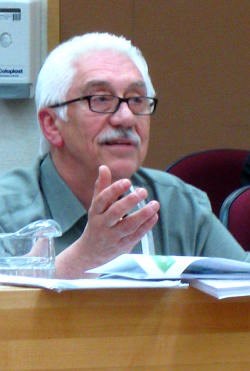The Elementa Group (formerly known as Enquest Power Corporation), has secured a five-year-deal to use Sault Ste. Marie's residential curbside waste in its proposed energy-from-waste plant.
Under motion approved by City Council Monday night, Elementa also gets a five-year renewal option on its deal.
Councillors required the company to have its plant built and operating within five years after receiving approval from the Ontario Ministry of the Environment.
Under the terms of the agreement, Elementa will not be building the new facility at the City's Fifth Line landfill, though.
"For good, sound reasoning we want to be separate but I think it's more for the interests of Elementa rather than us," said Sault Mayor John Rowswell at last night's meeting. "I think that, if I were to put myself in their shoes, I would want to be separate from us because they wouldn't want to be entangled should we have a problem."
Elementa President and Chief Executive Officer Jay Zweirschke also said the idea to separate the business of Elementa from the City's the landfill was a good one.
"It's been on the table almost since day one so it doesn't come as any surprise to us," Zwierschke said. "They have just cause - when you're dealing with the Ministry of the Environment, they like to keep the files organized, the City has its own Certificate of Approval for the landfill and I think they just want to make sure the two are kept separate."
Elementa is including the area adjacent or near the landfill in its list of places it could possibly locate its first commercial waste-to-energy plant said Zwierschke.
It's important to realize that, while Elementa's science has been proven on a small scale, it would be difficult to predict how a large scale operation of an energy-from-waste plant would impact the environment or how effectively the technology would work City Land Development & Environmental Engineer Susan Hamilton Beach told Councillors last night.
She said the money that's been spent so far to assess the effectiveness and environmental impact of Elementa's process is money very well spent because it could likely lead to a diversion of some quantity of trash the Municipality had intended to landfill.
"The decision to include Elementa's energy-from-waste technology as part of the City's integrated waste management system must be perceived by the community and Council as participating in an experiment," she said in her report to Council. "There remains uncertainty with regards to the feasibility of the project - ie. the revenue side of the financial model, overall plant reliability, efficiency and scalability."
Hamilton Beach said the deal is a good one provided Elementa bear the bulk of the financial risks involved in construction of a energy-from-waste pilot project, be responsible for obtaining its own necessary permits and agree that the city will only pay $60 a tonne to have it's garbage turned into electricity and synthetic gas by Elementa over the next five years.
She said other municipalities that have turned over their waste management at municipal landfills to private enterprises have seen significant increases in tipping fees to landfill users.
Hamilton Beach said these were not waste-to-energy plants like Elementa's proposed plant, but were the closest business models available to study in an environment of emerging waste-management technology.
With the agreement passed by Council last night, the city will pay Elementa $60 per tonne of City garbage it processes and will not be held liable for the quality or quantity of garbage it provides.
Elementa expects to be able to process 10 to 12 thousand tonnes of the City's curbside garbage yearly over the next five years.
The City will still manage the landfill and collect tipping fees from users which are currently set at $65 a tonne.
Some of those landfill users will likely take their garbage to Elementa instead, said Hamilton Beach.
"There's got to be a better way than dumping your garbage in the ground," said Ward 1 Councillor Steve Butland (shown). "Well this is part of an integrated solution."
Butland pointed to a two-inch binder, a spiral-bound report about an inch thick and two more stacks of paper each about half and inch thick on the desk in front of him.
"Hundreds of thousands of dollars in due diligence are right here," he said. "These are the quarterly reports to the MOE."
Elementa has satisfied the MOE and attracted the attention of people who are interested in building waste-to-energy plants in places as far away as Dubai in the United Arab Emirates, Australia, different locations in Europe and as relatively close to home as Toronto, Butland said.
The company believes it can scale up its technology and have it work as well and as cleanly as it has in the demonstration plant presently located at the landfill site on Fifth Line.
It's next steps will be to select a site for it's pilot commercial plant, obtain the necessary permits for it, build it and commission it.
Zweirschke said Elementa Group plans to have the plant commissioned 18 to 24 months from now.
Then it will begin to gather data to support its assertions while making money from electricity and synthetic gas made out of Saultites' trash.
